Last Updated on June 20, 2024 by Michelle
I wasn’t so sure, but it turns out Bill was right (yes, he made me write that down)… adding an established nuc of bees to your colony is an easy acccomplishment for new beekeepers.
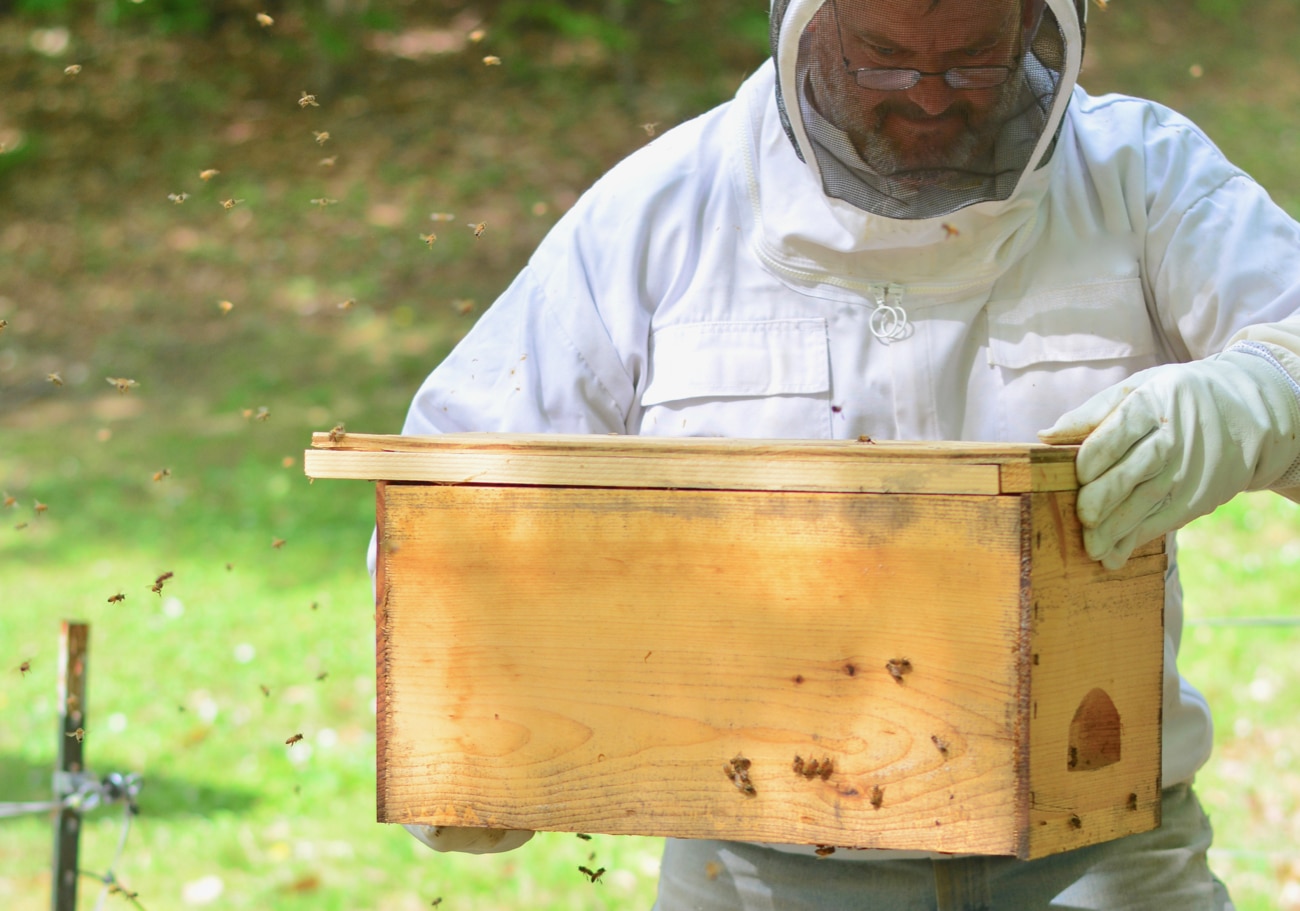
We’ve had bees for two years, but our first winter was a harsh one (even by New England standards) and we lost all 3 of our hives.
Last winter, we were elated that one hive made it through, and it’s thriving this spring.
We did make sure to prepare our apiary for winter and it paid off.
But we hope to always have at least two hives in our apiary. Cause, well, all-natural sugar is my jam y’all.
So today we introduced an established nuc to our apiary.
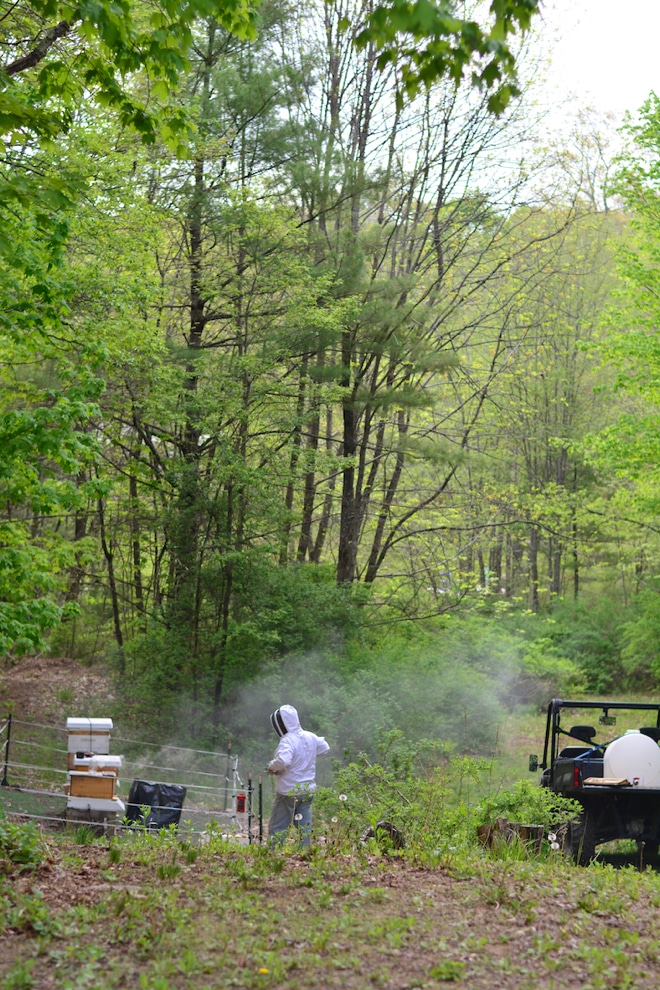
What is a bee nuc?
A nuc is a small honey bee colony that a beekeeper has created from a larger colony. This was what we were hoping to do ourselves this year, and our surviving colony is doing so well, we may have to. I’ll keep you posted on that one.
But I think they’re call “nuc” because of the fact that the queen is established with the colony, and she’s already at the “nucleus,” instead of being a new queen that you are introducing to a new hive.
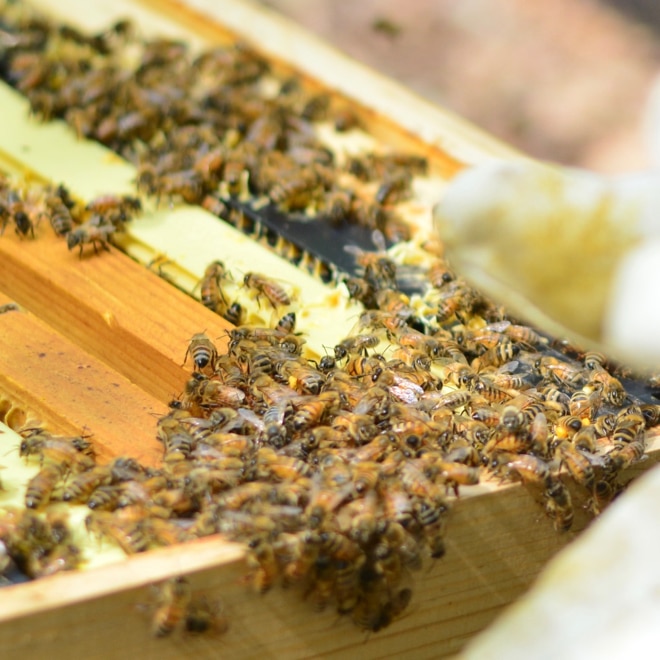
How is a nuc different than a package of bees?
When we purchased a bee package in the past it was very different than our experience today, of adding the nuc to our apiary. A package of bees come in a wooden frame box with screen on two sides, and they’re sold by the pound. (They say there are roughly 3,500 bees per pound, but I have zero idea how they know this. I don’t think I’ll test the theory.) I’ve shared about this and show you the way the new bees come packaged in a previous post.
Because they’re not an established colony, packaged bees don’t have any hives or honey that they bring with them–they just bring wonderful potential and eagerness to make sure your vegetable garden produces well, keeping it well pollinated.
In case you’re wondering, they don’t ship them to you without any food, of course. They have a little feeding can filled with a syrup mixture to keep them happy until they can find your flowers and blooming veggies when they’re home in your apiary.
The queen comes separately in a small wooden box, packaged up with a few worker bees to keep her happy (oh to be a queen…)
In a bee package, the bees aren’t necessarily related to each other, and they’ve never met the boxed queen until you introduce her to them.
A nuc, on the other hand, is a group of bees and a queen who are related to each other and well established. I’m told that typically nucs have 4 established frames–two of honey, and two of brood (the queen’s eggs she’s recently laid that the workers are busy feeding and caring for).
Our nuc came from a friend and local beekeeper and had 5 frames that were all intermixed with honey and brood.
What’s better? Nuc or Package?
If you purchase a package of bees:
- It’s less expensive. Well, up front at least.
- You’ll probably have an easier time finding a package than a nuc.
- You can introduce a package of bees to any set up you have. (Your boxes don’t need to hold the exact sized frames that a nuc comes with.)
- You get to watch the whole experience, from day one, of a new colony of bees doing their thing and creating their comb.

If you purchase a nuc of bees:
- You’ll have honey sooner and possibly a more productive colony overall. (Super important if you’re a crazy person trying to have a productive apiary in a cold climate. Cough. Cough.)
- Your bees will get to take in all that spring has to offer, instead of spending weeks just building a comb and missing all those forsythia and lilac blooms (aka more honey for you next year). If you look closely at the close up of our new bees, above, you’ll see these guys have already been scouring our homestead and building up sacs of pollen.
- Your bees are family. They know the drill and how to work together well. So your queen is super happy and productive, right from day one.
- You won’t have any bees asking you “What’s for dinner?” since there’s no need to feed them. (Remember, a nuc of bees comes with their own honey.)
- Your bees will be pretty happy, from day one. You’re bringing the bee’s home with them, instead of shaking them into empty frames and telling them to set up shop.
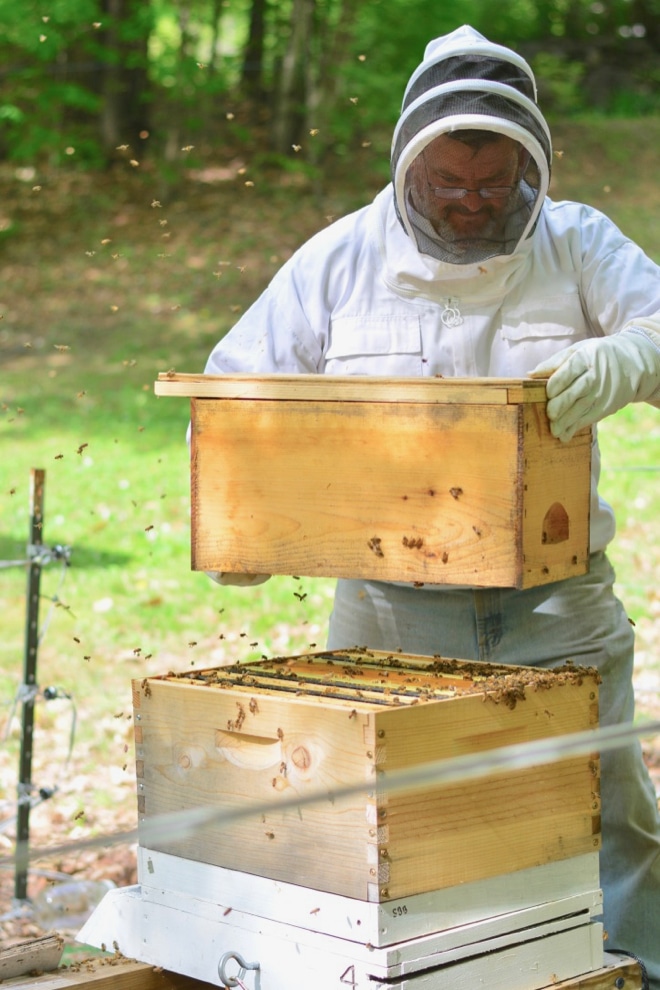
I will say, as a follow up to #5, we still had tons of bees swarming all over the nuc box after placing the 5 frames into our colony box, so our guys did get some shaking too, to tell those slackers where they needed to go.
But still, nuc installation is much less stressful for the bees, even our stragglers. A package of bees is shaken into a bare, empty hive in a strange new home.
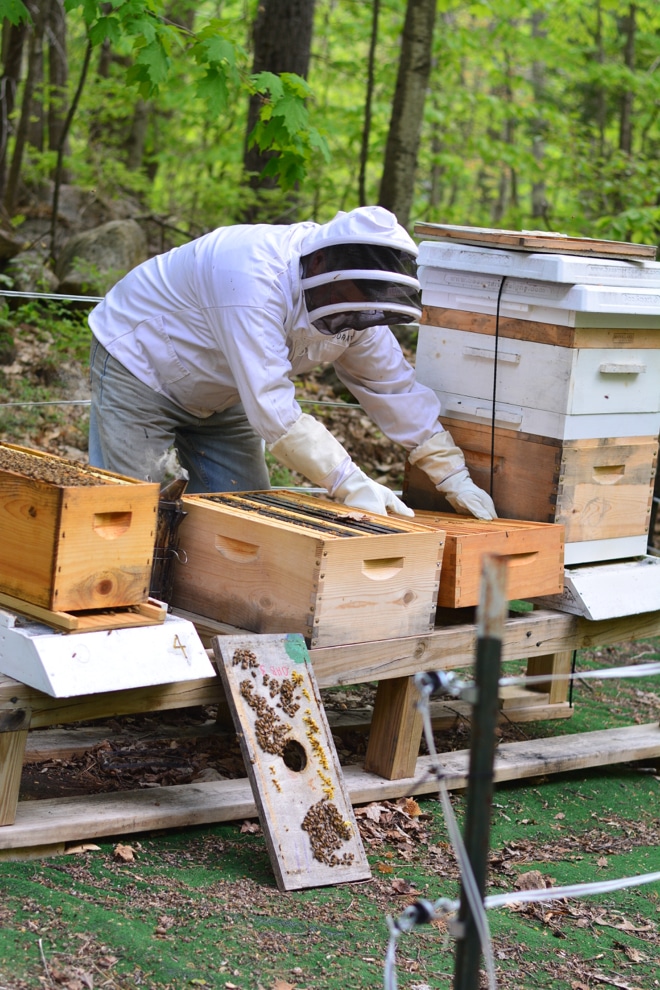
Should you consider adding an established nuc of bees to your colony?
Essentially, introducing a nuc of bees to your colony is about as easy as it comes with beekeeping. It’s easier for both you and the bees than starting off with a package of new bees and a new queen.
If, like us, you happen to have a friend selling a nuc for less than a package of new bees you’d be crazy not to give it a try.
Now I’m heading out to the garden to plant more sunflowers. Because sunflower honey is amazing, guys. Just sayin.
I’ll leave you with a picture of our last harvest. Be still my heart. (And thank you, my sweet bees.)
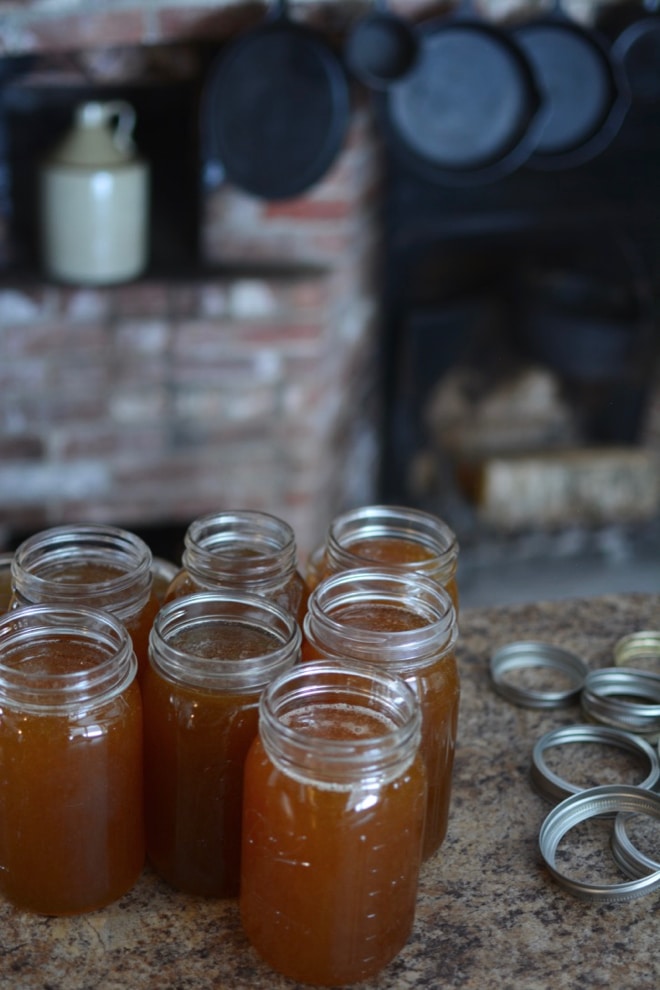
Listen in to a recent episode of the Simple Doesn’t Mean Easy podcast on this same topic right here… (Or find links to the podcast via your favorite podcast player right here.)
Other articles about beekeeping & all-natural sugar:
How we prepare our hives for winter.
Free resources for new beekeepers.
Growing & caring for lilacs–a flower our bees love.
A delicious DIY salad dressing made with raw honey.
Making maple syrup–step by step.
All hard work brings a profit. Proverbs 14:23
Pin this for later!
Click on the image below to pin this post.
Find out why SoulyRested was considered to be one of the Top 20 Must-Read Homesteading Blogs of 2018 and then one of the Top Homesteading Blogs of 2019 as well.
I’d love to connect!
To find me in some other neck of the woods, just click any (or every!) icon below:
And please follow along!


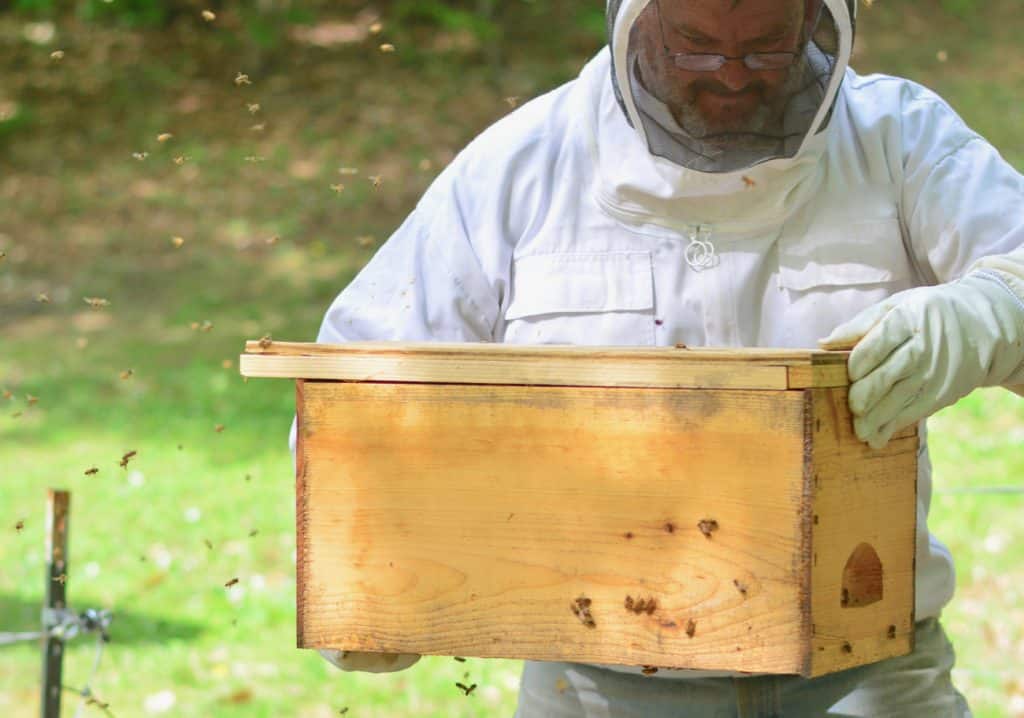
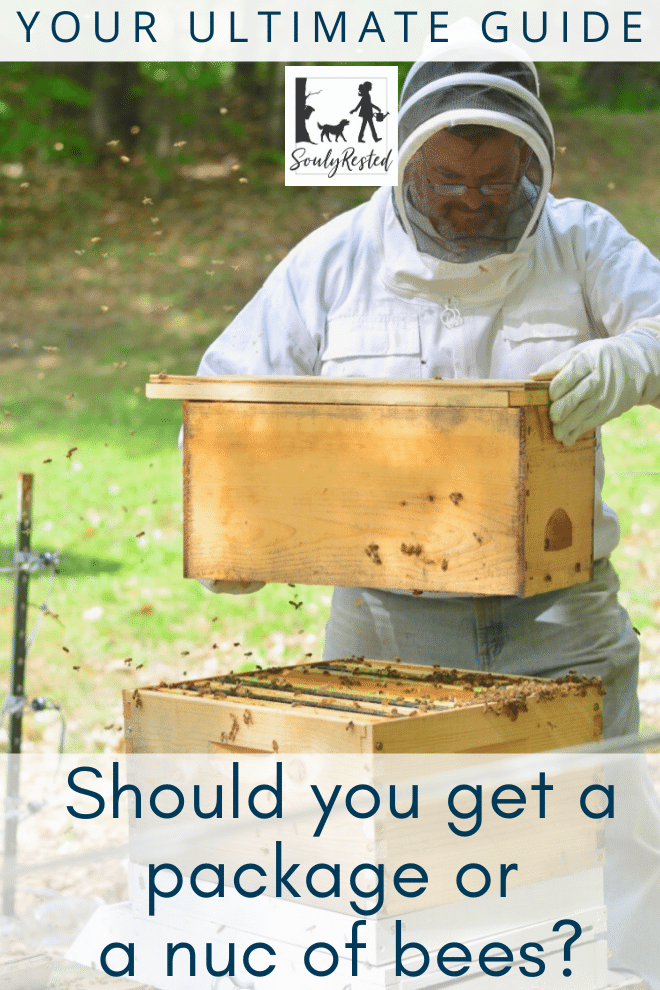





I recently took the bee keeping class offered at our local extension center, and I have to say, that your explanation was one of the best I’ve heard.
We have a beekeeper three doors down and it’s good to know that his bees may be enjoying some of our sunflower nectar! Who knew?
Enjoy your busy workers…
Wow! I am thrilled that my explanation rivaled an extention office class! Little ole, still-learning-this-beekeeping-thing me. 🙂 So glad you found it helpful Daisy!